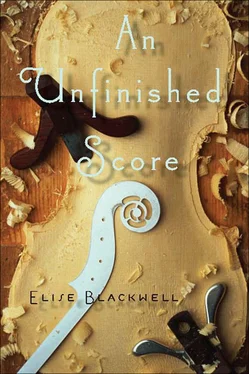When she gets to her bedroom, Ben is packing.
“I forgot you’re leaving tomorrow.”
“You seem to have a lot on your mind lately,” he answers, his tone neutral.
She stalled him after Alex’s death — several days, a week, strange that she cannot remember exactly. She stalled him not because it would have made Alex the last — she hadn’t seen him for a month when he died — but because she feared some emotional ignition. She was afraid she would burn white heat and confess every wrong thing she has ever done. But she could not, or did not, stall longer, and she and Ben have made love several times since. She was surprised by how easy it was to give away nothing. Now she reaches for his hand: they always have sex the night before one of them goes away. It is almost a superstition, a required act. Even when it was her leaving to see Alex, she and Ben would sleep together. The next morning, shaving her legs in a bubble bath, she would separate the two realities into Ben-time and Alex-time, two things that were both true but were divided by water and had nothing to do with each other.
Tonight Ben has left the light on in the bedroom closet so that he can see her. And she can see him, the ropes of his stomach muscles leading up to the broader muscles of his chest, shoulders, arms reaching to hold her hips, guide their motion. A still-young man who has stayed in shape to play the piano and the cello even though he abandoned performance years ago. She presses her hands on his chest, for balance and for leverage, and she and Ben let themselves go completely, eyes still open. It’s the closest they ever come to seeing each other, to really speaking.
In the morning she sleeps through his leaving, his good-bye only a short note on the kitchen counter.
It sits on the center of Petra’s palm, looking more like a computer chip than the swirled snail of the hearing inner ear.
“The implant imitates the cochlea not in appearance but in function,” the doctor tells them.
He has the good looks of Spanish youth, reminding Suzanne of the tall, healthy musicians she played Carmen with one summer in Seville. They attacked the music, grinning with the schmaltz of it, taking her later for wine near the university that was once Carmen’s tobacco factory. “Tourist season,” they shrugged, and she felt happy. She was not a tourist but a musician leading an extraordinary life, a woman meeting her lover in Lisbon two days later.
The doctor’s smile does not seem disingenuous, but it is easy, offered without real thought. “It both will and won’t make her hear, depending on how you conceptualize hearing.”
Petra repeats her question: “Will she be able to hear?”
“The implanted electrodes introduce signals that are carried by the auditory nerve fibers to the brain, allowing sound to bypass the damaged portion of the ear. Is this hearing? Yes and no. The sound processor translates microphone signals into electrical stimuli. These elicit patterns of nerve activity that Adele’s brain will interpret as sound.”
“So the answer is no; she won’t hear.” Petra leans back in the armchair, folding her arms.
“More than ten percent of patients receiving the implant can communicate without any lip reading at all. They can converse with their eyes closed, you understand, talk on the phone. Most recipients can communicate fluently in spoken language when it’s combined with lip reading. Many can distinguish pitch. The numbers are only getting better.”
Petra shifts forward again. “But aren’t the outcomes much better in people who have lost their hearing? You know, who remember what speech sounds like and already know how to talk.”
“Of course.” The doctor still smiles. He is not talking about his child, and he speaks with energy and good cheer. “But we are having tremendous success with those who have been profoundly deaf from birth, provided—”
Petra laughs. “‘Profoundly deaf.’ That’s funny.”
“Provided that we implant close to the optimal age range and follow up with education and therapy. If we can implant Adele in the next six months — sooner is better, understand — I have every reason to believe that she will live a normal life in the hearing world.”
“‘A normal life.’” Petra laughs again. “Can you get one of those for me, too?”
The doctor smiles, aware that she is joking but not quite getting it.
“When do you need to know?” Petra asks.
“We can complete the presurgery therapy and schedule the procedure with about two months’ notice.”
Petra stands, her posture erect but awkward, one hip stuck out too far, like the marionette of an unskilled puppeteer. “I’ll call you in four months if I decide to do it.”
The doctor’s smile is gone. “Your daughter really is an excellent candidate. Think about what her life will be like without speech. It will limit who her friends are, who she can marry, what kinds of work she can have. She’s such a smart little girl, so lovely and sweet.”
“I think about that all the time. Can you really think that I don’t think about that all the time?” Petra pulls on Suzanne’s hand, her voice calming some but still loud when she says, “You need to get me out of here.”
“Wait,” says the doctor. He writes a room number on a piece of paper. “Go back out front, cross the courtyard, and enter the other wing. Some of the therapists are in with a group of children. Go see what they’re doing before you close your mind.”
The doctor has misread Petra. Petra is impulsive, but her impulses are complex, and she often clings to an idea most tightly right before she throws it down. Every time she decides to quit drinking for a stretch, she begins with a bender. If she’s arguing with the doctor against the implant, it’s because she’s leaning toward the surgery.
“Poor little irony,” Petra says when they reach the hedge-lined courtyard.
A couple passes them, and Suzanne’s legs shake under her weight. She avoids eye contact; she does not want to see people who are visiting terminally ill children. Perhaps, she hopes, Adele’s deafness works like a charm, protecting her from early sickness and death, her ante already in the pot, her dues already paid.
Suzanne nods to a bench. It is important that Petra calm down before they see the therapist and children. Suzanne is sympathetic, knowing that Petra may hear what she hears all the time: “How ironic: you’re a musician and your daughter is deaf.”
Because everyone knows a bit of Beethoven’s story and because so many rock musicians have lost their hearing to earphones and amplifiers, people associate deafness and music, even if they label it as irony. Some suspect, even, that the mind’s ear hears more perfectly than the actual ear. There’s the story about Schubert: he claimed the piano was more distraction than help in composing. Someone with perfect pitch needs only pencil and paper to write music.
“The Beethoven effect,” Suzanne says.
“What people forget,” Petra launches a speech she has given before, “is that hearing loss was more common in Beethoven’s day — as likely to strike a musical genius as anyone else but not more likely. They forget that or else they want to overlook it because they think it’s romantic. Even you, even you think it’s romantic that she’s deaf.”
Suzanne exhales. “That’s not fair, Petra.”
Suzanne often argues that Beethoven composed his best stuff late in life not because of his hearing loss but despite it, building on decades of work and study and thought. It is that way with most composers, at least those who aren’t stunted prodigies. Beethoven hated being deaf, railed against it. He wanted to hear his Ninth Symphony not just in his mind but with his ears.
Читать дальше












